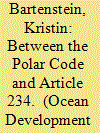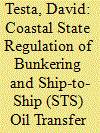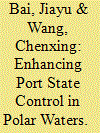| Srl | Item |
| 1 |
ID:
169288


|
|
|
|
|
| Summary/Abstract |
In January 2017, the Polar Code entered into force and prompted the adoption, in Canada, of the Arctic Shipping Safety and Pollution Prevention Regulations (ASSPPR). The latter incorporate the Polar Code with a view to maintaining or increasing the preexisting level of protection. Consequently, a balancing act plays out in the ASSPPR, which are partly based on the Polar Code and partly on an alternative jurisdictional basis, arguably Article 234 of the United Nations Convention on the Law of the Sea. The objective of this article is to map out and put into historic perspective the balance chosen by Canada in the ASSPPR.
|
|
|
|
|
|
|
|
|
|
|
|
|
|
|
|
| 2 |
ID:
169289


|
|
|
|
|
| Summary/Abstract |
While the United Nations Convention on the Law of the Sea (LOSC) expressly allocates jurisdiction in regard to several activities that are conducted in the exclusive economic zone (EEZ), it does not do so for bunkering and ship-to-ship (STS) oil transfers. This article sheds light on different types of bunkering operations, as well as on the often-overlooked practice of STS oil transfers. It suggests that in the case of bunkering, the allocation of jurisdiction as between coastal and flag states depends on the activity of the vessel being bunkered. In the case of STS oil transfers, it concludes that jurisdictional competence needs to be determined in line with Article 59 of the LOSC. The article also examines relevant state practice and contends that the LOSC’s ambiguity is no license to unfettered coastal state regulation.
|
|
|
|
|
|
|
|
|
|
|
|
|
|
|
|
| 3 |
ID:
169286


|
|
|
|
|
| Summary/Abstract |
In recent years, the role of Port State Control (PSC) with respect to polar navigation has become increasingly important. However, international rules for PSC of fishing vessels plying polar waters are incomplete and uniform inspection guidelines have not yet been adopted, nor has a coordinated mechanism been created. This article argues that fishing vessels should be incorporated into the Polar Code and that at the practical level, states should promote the application of the Port State Control Officer Guidelines adopted under the Paris Memorandum of Understanding and encourage cooperation among the different PSC organizations that cover polar waters.
|
|
|
|
|
|
|
|
|
|
|
|
|
|
|
|
| 4 |
ID:
169287


|
|
|
|
|
| Summary/Abstract |
Measures to ease tensions and prevent military conflicts adjacent to the Korean Peninsula Northern Limit Line (NLL) are an integral part of the ongoing reconciliatory efforts between the South and the North. Despite controversies over the validity of the NLL, it has served as a de facto maritime demarcation line in the absence of an agreed-upon maritime demarcation line under the Armistice Agreement. North Korea has persistently attempted to invalidate the NLL, while South Korea has supported the status quo of the NLL as a military demarcation line. The South and North have recently created a buffer zone across the NLL in the West Sea amid talks for North Korea’s denuclearization.
|
|
|
|
|
|
|
|
|
|
|
|
|
|
|
|